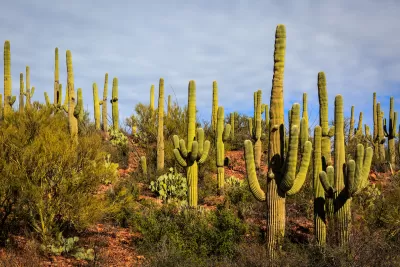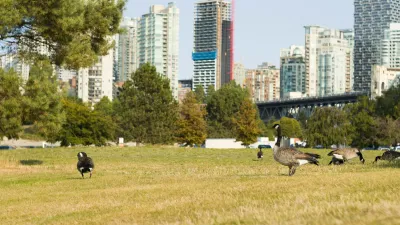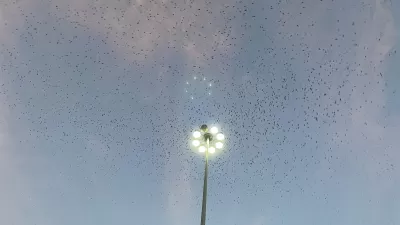Conservation groups in Arizona are suing to stop a freeway project that would destroy essential habitat for the cactus ferruginous pygmy owl.

A tiny, threatened owl species in the Southwestern desert could spell doom for a major interstate freeway project. As Kea Wilson explains in Streetsblog USA, a lawsuit brought by environmental groups charges that the Federal Highway Administration’s (FHWA) proposal to build Interstate 11 through Arizona could decimate the owl population and destroy fragile desert habitat.
“Lead by the Center for Biological Diversity, the suit builds upon a 2022 legal challenge which alleged that the FHWA had missed critical environmental review steps required under the Environmental Protection Act when it first proposed the western and eastern options for the highway — and now, they say it's also in violation of the Endangered Species Act, since the pygmy owl was federally designated as "threatened" in July of 2023.”
Despite the owl’s diminutive size, Wilson notes that its status as apex predator means any impacts on the owl species could reverberate across the local food chain.
The threat to the pygmy owl isn’t the only objection people have to the freeway project. The region’s water supply is already severely strained. “If I-11 is built, though, it will almost certainly usher in a spate of new development which the Center for Biological Diversity estimates will multiply the population tenfold — and multiply water use to a staggering 1,180 percent.” The environmental analysis did not take potential new water needs into account. Meanwhile, community advocates say building the road through Tucson would deepen existing inequalities and further divide communities.
Russ McSpadden, Southwest conservation advocate at the Center for Biological Diversity, urges Arizona to “confront its transportation challenges without building a brand new mega-highway — by expanding transit services, bike lanes, and pedestrian infrastructure within mega-metros that already exist, rather than exhausting those funds for water-draining, suburb-spawning highways.”
FULL STORY: Can This Tiny Owl Defeat One of America’s Biggest Highway Projects?

Planetizen Federal Action Tracker
A weekly monitor of how Trump’s orders and actions are impacting planners and planning in America.

Congressman Proposes Bill to Rename DC Metro “Trump Train”
The Make Autorail Great Again Act would withhold federal funding to the system until the Washington Metropolitan Area Transit Authority (WMATA), rebrands as the Washington Metropolitan Authority for Greater Access (WMAGA).

The Simple Legislative Tool Transforming Vacant Downtowns
In California, Michigan and Georgia, an easy win is bringing dollars — and delight — back to city centers.

The States Losing Rural Delivery Rooms at an Alarming Pace
In some states, as few as 9% of rural hospitals still deliver babies. As a result, rising pre-term births, no adequate pre-term care and "harrowing" close calls are a growing reality.

The Small South Asian Republic Going all in on EVs
Thanks to one simple policy change less than five years ago, 65% of new cars in this Himalayan country are now electric.

DC Backpedals on Bike Lane Protection, Swaps Barriers for Paint
Citing aesthetic concerns, the city is removing the concrete barriers and flexposts that once separated Arizona Avenue cyclists from motor vehicles.
Urban Design for Planners 1: Software Tools
This six-course series explores essential urban design concepts using open source software and equips planners with the tools they need to participate fully in the urban design process.
Planning for Universal Design
Learn the tools for implementing Universal Design in planning regulations.
Smith Gee Studio
City of Charlotte
City of Camden Redevelopment Agency
City of Astoria
Transportation Research & Education Center (TREC) at Portland State University
US High Speed Rail Association
City of Camden Redevelopment Agency
Municipality of Princeton (NJ)





























